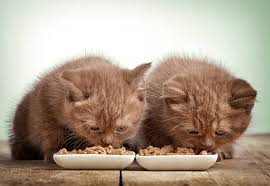Choosing the Best Kitten Food: A Comprehensive Guide
As a responsible pet owner, ensuring your kitten receives proper nutrition is crucial for their growth and development. Selecting the right kitten food is the foundation of their overall well-being. In this guide, we’ll explore the key factors to consider when choosing kitten food that meets their dietary needs.

The Importance of Proper Kitten Nutrition
A kitten’s nutritional requirements differ from those of adult cats. During their early stages of life, kittens undergo rapid growth, which demands a higher intake of certain nutrients. The right kitten food provides essential nutrients for their bone development, immune system support, and energy levels.
Understanding Your Kitten’s Dietary Needs
Before diving into the variety of kitten food options available, it’s essential to understand the specific dietary needs of your furry friend. Here are some factors to consider:
Protein Content
Protein is a cornerstone of a kitten’s diet, as it supports muscle growth and overall health. Look for kitten foods with high-quality animal-based protein sources, such as chicken, turkey, and fish.
Essential Nutrients
Your kitten requires a balanced mix of vitamins, minerals, and fatty acids. Omega-3 fatty acids, for example, are vital for brain development and a healthy coat.
Calories and Energy
Kittens are energetic and require more calories per pound of body weight than adult cats. Opt for kitten food formulated to provide the necessary energy for their active lifestyle.
Avoid Fillers
Choose kitten food with limited or no fillers like corn, soy, and wheat. These additives offer little nutritional value and can lead to digestive issues.
Stay tuned as we delve deeper into different types of kitten food, including dry kibble and wet options, and how to transition your kitten to a new diet.
Types of Kitten Food: Dry Kibble vs. Wet Options
When it comes to feeding your kitten, you’ll encounter a variety of kitten food options, with dry kibble and wet food being the most common choices. Each type has its own benefits, and understanding them will help you make an informed decision:
Dry Kibble
Dry kibble is convenient and cost-effective. It promotes dental health by helping to reduce plaque and tartar buildup. Look for high-quality dry kibble with animal protein as the main ingredient. Ensure your kitten has access to fresh water at all times, as dry kibble can be less hydrating compared to wet food.
Wet Food
Wet kitten food has a higher moisture content, helping to keep your kitten well-hydrated. It can be more palatable for picky eaters and is suitable for kittens with dental issues or those prone to urinary tract problems. Opt for wet food with real meat or fish as the primary ingredient.
How to Transition Your Kitten’s Diet
Switching your kitten’s diet requires a gradual transition to avoid digestive upset. Follow these steps for a smooth dietary change:
Gradual Transition
Mix a small amount of the new kitten food with their current food. Over the course of about a week, gradually increase the proportion of the new food while decreasing the old food.
Monitor Their Response
Observe your kitten’s behavior and stool during the transition. Any sudden changes may indicate a need to slow down the process.
Consider Preferences
Pay attention to your kitten’s preferences. Some kittens may take to the new food quickly, while others may need more time to adjust.
Kitten Food FAQs
1. Q: How do I choose the right kitten food?
A: Opt for high-quality kitten food with essential nutrients, real meat, and no fillers. Consult your veterinarian for specific recommendations.
2. Q: Is wet or dry kitten food better?
A: Both have benefits. Wet food provides hydration, while dry kibble promotes dental health. Consider a mix or consult your vet.
3. Q: How often should I feed my kitten?
A: Kittens need more frequent meals—about 3 to 4 times a day to support their rapid growth and energy needs.
4. Q: Can I feed my adult cat’s food to a kitten?
A: No, kittens have different nutritional needs. Choose food formulated specifically for kittens to meet their requirements.
5. Q: When can I start introducing solid kitten food?
A: At around 4 weeks old, you can begin offering a soft, moist kitten food to complement their mother’s milk.
6. Q: Should I free-feed my kitten?
A: It’s better to follow a feeding schedule to monitor their intake, ensure proper growth, and prevent overeating.
7. Q: What if my kitten is a picky eater?
A: Experiment with textures and flavors, but prioritize nutrition. Consult your vet if you’re concerned about their eating habits.
8. Q: Can I make homemade kitten food?
A: Homemade diets can be challenging to balance correctly. Consult your vet to ensure your kitten’s nutritional needs are met.
9. Q: What nutrients are crucial for kitten growth?
A: Protein, essential fatty acids, vitamins, and minerals are vital for bone development, immune support, and overall health.
10. Q: How can I safely transition my kitten to a new food?
A: Gradually mix the new food with the old over about a week to prevent digestive upset. Monitor their response during the process.
Conclusion
Selecting the right kitten food is an essential aspect of providing your furry friend with a healthy and happy life. By understanding your kitten’s unique nutritional needs and considering factors such as protein content, essential nutrients, and energy requirements, you can make an informed choice.




